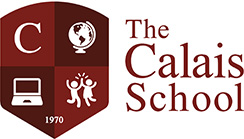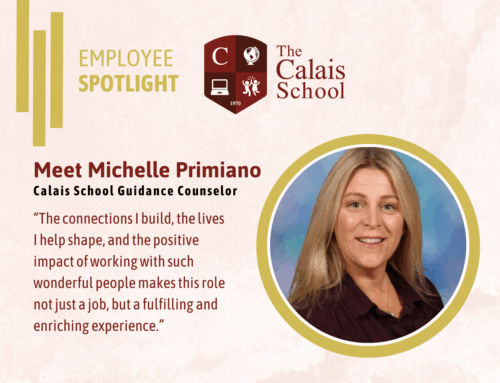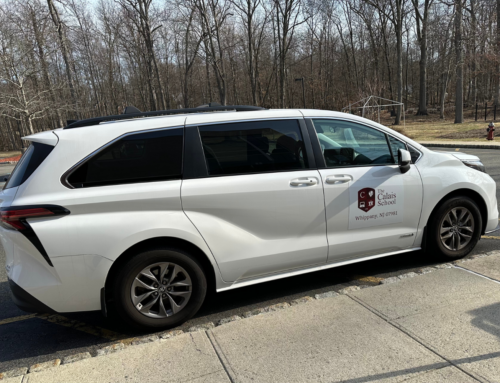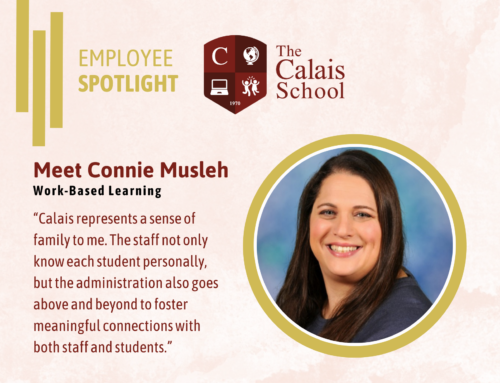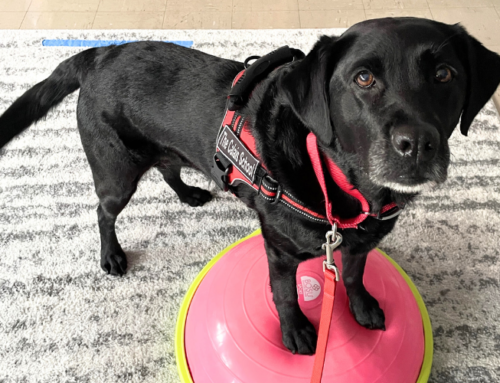As many teachers and students deal with the challenges of distance learning during the coronavirus pandemic, Animal Assisted Intervention (AAI) dogs and their handlers face even more hurdles as they try to assist special needs students.
At the Calais School in Whippany, a state approved highly therapeutic special education school for students in grades K through 12 Plus with multiple learning disabilities, dogs and handlers in the school’s AAI program are rising to the challenge as they come up with dynamic and creative ways each day to assist and motivate students.
Calais dog handlers Michelle Kearsley and Susan Greenbaum create regular daily updates on the school’s dogs featuring photos and notes on how each dog spent their day at home which they post on Google Classroom. The students are accustomed to seeing the dogs every morning when they arrive at school and again in the afternoon when they leave. Posts range from a photo about a dog smelling the daffodils to celebrating a birthday with special treats. The posts give students a close-up look into the daily lives of their favorite canines.
On a recent day, AAI dog Oreo, a Shetland Sheepdog, tried playing basketball, but the hoop was too high. A photo of Oreo with a basketball accompanies the post. Another photo on a different day shows Oreo with a soccer ball. The dogs enjoy playing games outside and to make the posts more interactive, students are then asked what games they enjoy playing outside. For April Fool’s Day, the handlers put apples in the dog’s dishes instead of their usual dog food. Gideon was not happy about the joke, but Orbit fooled everyone when he took Gideon’s apple, played with it like a ball and then ate it.
In regular sessions with the dogs at the school on a normal school day, special needs students usually pet the dogs, snuggle with them or read books to them. “Online AAI poses a challenge because the students are not able to physically touch the dogs like they are used to in normal sessions,” said Kearsley, who has worked at Calais since September.
“Like everyone, we are working to become conversant with the technology,” Greenbaum said. “We also are modifying some techniques and materials, so they are more easily viewed online.”
The whole process is exciting, noted Greenbaum, who has worked at Calais since January 2018. “Learning the new technology, working to figure out an effective setting for the dogs to use, teaching the dogs new skills, and continuing to collaborate with our wonderful speech and counseling therapists, counselors, and reading specialists is exhilarating,” she said. “There are techniques being developed which are useful now and will be useful after we return to the classroom.”
As a handler, Kearsley said she “facilitates the connection and communication between the student and the dog.”
Since the students are not able to touch the dogs as they would when they are in school, Kearsley said she uses cards and dice to help the dog answer questions. She mainly uses the cards for yes and no questions and the dice are used for speech, reading and occupational therapy. “We just get the dogs involved any way that we can. The dog will tell them whether they answered the question correctly or not.”
Greenbaum maintains that the students are always very receptive to the dogs. “In addition to the regular sessions the students are accustomed to working with the dogs, which give students a sense of continuity and normalcy,” she said. “Our students, like many people, have expressed a lot of anxiety about the current quarantine.”
In counseling sessions, she has her dogs roll dice to ask questions that may be similar to the concerns shared by students such as “when will we go back to school?’ and “how can I stay safe?” or “why can’t I see my friends?”
“This gives the counselor the opportunity to answer the student’s questions and explore their concerns,” Greenbaum said.” Students have asked the dogs if they are nervous. This allows the counselor to address techniques to handling stress.”
The dogs also had to get accustomed to using the computers and not directly interacting with the students. “The dogs were initially confused and would look under and behind the computer monitor to try to locate the students,” Greenbaum said. “This facilitated conversations regarding the dogs missing the students and how the dogs had to adapt to this new method of spending time with them. After several sessions, all the dogs seem to have accepted the students are somehow in the box.”
During the sessions, the dog doesn’t necessarily look at the computer the whole time as they are busy with their tasks, Kearsley noted. “When Oreo hears a familiar student, he will look toward the computer to look for them. The students can continue their relationships and communicate with the dogs. We have been very successful with counseling, speech and reading sessions and are excited to start adding our occupational therapy sessions as well.”
Greenbaum notes that “the continuity of working with the dogs helps normalize the Long-Distance Learning experience. It has been surprisingly well received by the students.”
“We have a very successful AAI program during normal circumstances,” said Calais School Executive Director David Leitner. “The dogs and their handlers are working extra hard to assist students as we implement distance learning and the students have responded beautifully. We are thrilled that the program has succeeded beyond our expectations and making such a difference to our students as they deal with the stresses of online learning, not seeing their friends, not attending school and the global pandemic. The regular contact with the dogs, even though it is online and they are unable to pet or have direct contact with the dogs, has helped them adapt to these difficult times which have become ‘the new normal’ for all of us, but can be especially difficult for a child with special needs. The dogs and their handlers are assisting students with everything from reading to counseling and speech to occupational therapy.”
For more information or to schedule an interview, please contact Allison Freeman at Allison.Freeman@thecalaisschool.org.
 973-884-2030
973-884-2030 